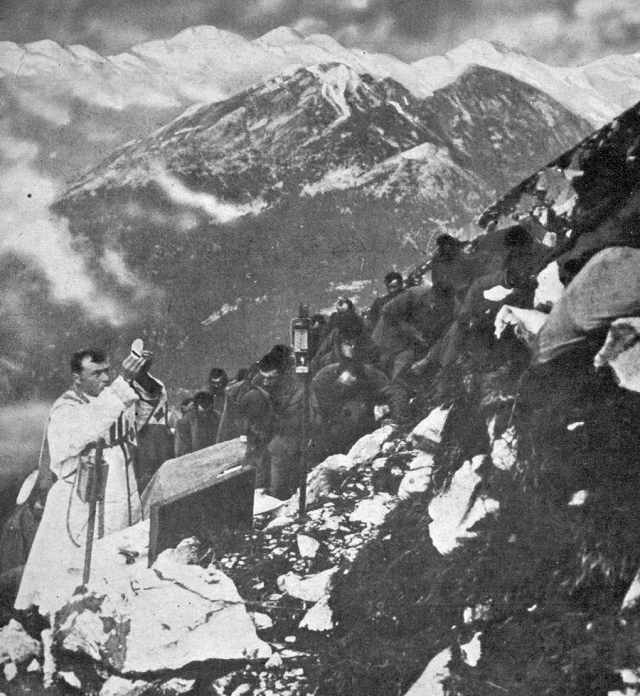
A Priest says Mass for Italian Troops in the Mountains of The Tyrol.
I have lifted up my eyes to the mountains, from whence help shall come to me.
My help is from the Lord, who made Heaven and Earth.
(Psalm CXX. Douay-Rheims Version)
.jpg&container=blogger&gadget=a&rewriteMime=image%2F*)
“The dangers in the new rite are not immediately apparent. They are not apparent because Catholics, brought up in the faith, do not know of the attraction Protestantism has for our fallen human nature, how lethal it is, and do not recognise its symptoms…
It seems to me that Protestantism comes easier to fallen human nature than does the true faith. It can seem more attractive. It lets us live lower down the mountain of God. It makes fewer demands on us. It does not call for that total submission of intellect and will that God requires of His rational creatures. It does not call for the “obedience of faith” that St. Paul speaks of.
Someone who had never before smelled phosgene [poison gas] might at first think it a pleasantly sweet smell. Catholics with only a book knowledge of Protestantism might well think, at first encounter and not recognising it as such, “This is very attractive. Why was it all made to look so difficult before?” Having been reared an Anglican, I recognise it and want to keep away.
.jpg&container=blogger&gadget=a&rewriteMime=image%2F*)
One of the main dangers of the new rite is that it presents no built-in bulwark against a gradual slide into a Protestantised liturgy, and thence into Protestantism.
One obvious difference between Catholic and Protestant liturgy is that the Catholic liturgy is sacramental. Christ operates directly, immediately, in each of the sacraments, and in the sacramental sacrifice of the Mass He is always the principal Celebrant.
Protestant liturgy is non-sacramental, ex opere operantis not ex opere operato. When I was an Anglican our liturgy was very reverent, very devout and correct, and was carried out with great decorum. But it all depended on us. There was no sense of anything objectively happening on the altar table – for the very good reason, of course, that nothing did happen on the altar table.
.jpg&container=blogger&gadget=a&rewriteMime=image%2F*)
Protestant liturgy, in the absence of the Divine Sacrifice, offers God the sacrifice of praise, the sacrifice of a humble and contrite heart, the offering of devout hymns. This is good in itself, but it is no substitute for the Sacrifice that God has asked us to offer in memory of Him.
The new rite allows the celebrant to move the style of the liturgy in a Protestant direction…
When people forget about Original Sin, they are unaware of the chronic weakness of our intellect and wills, and of our chronic tendency to slide into error and sin. Our faith needs a frequent input of doctrinally nourishing liturgy if it is to stay pure. The traditional rite of Mass provided this. The new rite does not.
.jpg&container=blogger&gadget=a&rewriteMime=image%2F*)
There is no heresy in the new rite. Rome cannot authorise heresy. But the new rite, it would seem, does not give us enough Catholic doctrine to prevent Catholics from unwittingly becoming Protestant in their thinking. As Fulton Sheen put it, “If you don’t behave as you believe, you will end by believing as you behave.” The new rite of Mass is capable of being carried out in a Protestant manner. Given the chronic tendency of our fallen human nature to go for what is easier, our liturgy, in the hands of the ill-instructed, will always tend to a Protestant interpretation. And Catholic liturgy carried out in a Protestant manner will lead the worshippers to Protestantism.
“Where will it all end?” So far as I am concerned, it has ended by my being resolved to offer Mass, as much as possible, in the traditional rite of the Church. This rite exactly expresses my Eucharistic faith. The new rite does not. Neither does it nourish my faith. The traditional rite of Mass has nourished the faith of countless Catholics in the years past. Please God it will do the same for me, and for many others, in the years to come.” – (Read the whole article on Thoughts on the New Rite of Mass)
.jpg&container=blogger&gadget=a&rewriteMime=image%2F*)

No comments:
Post a Comment